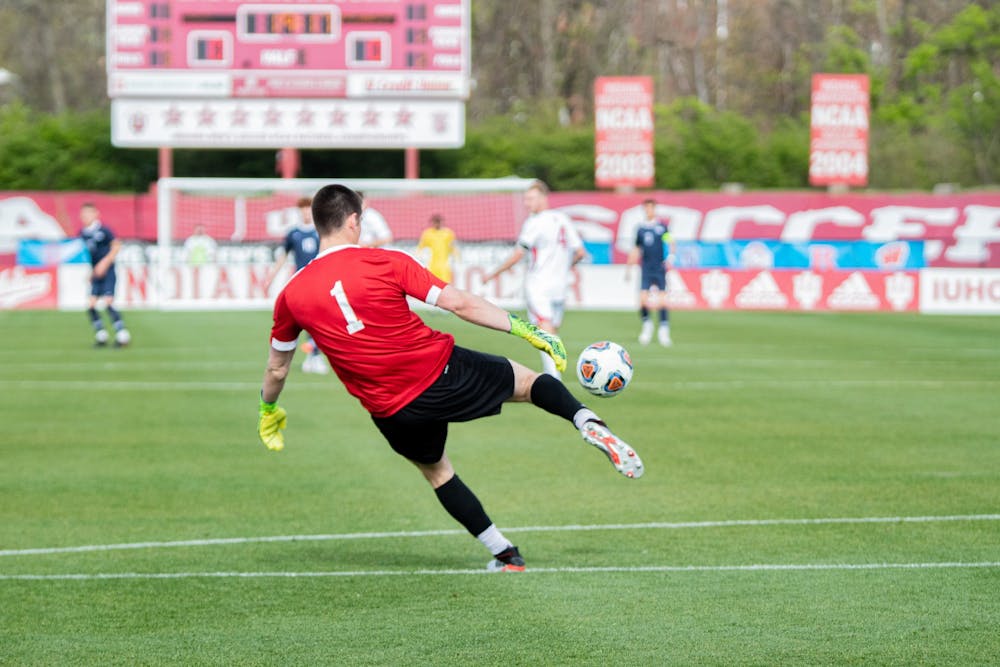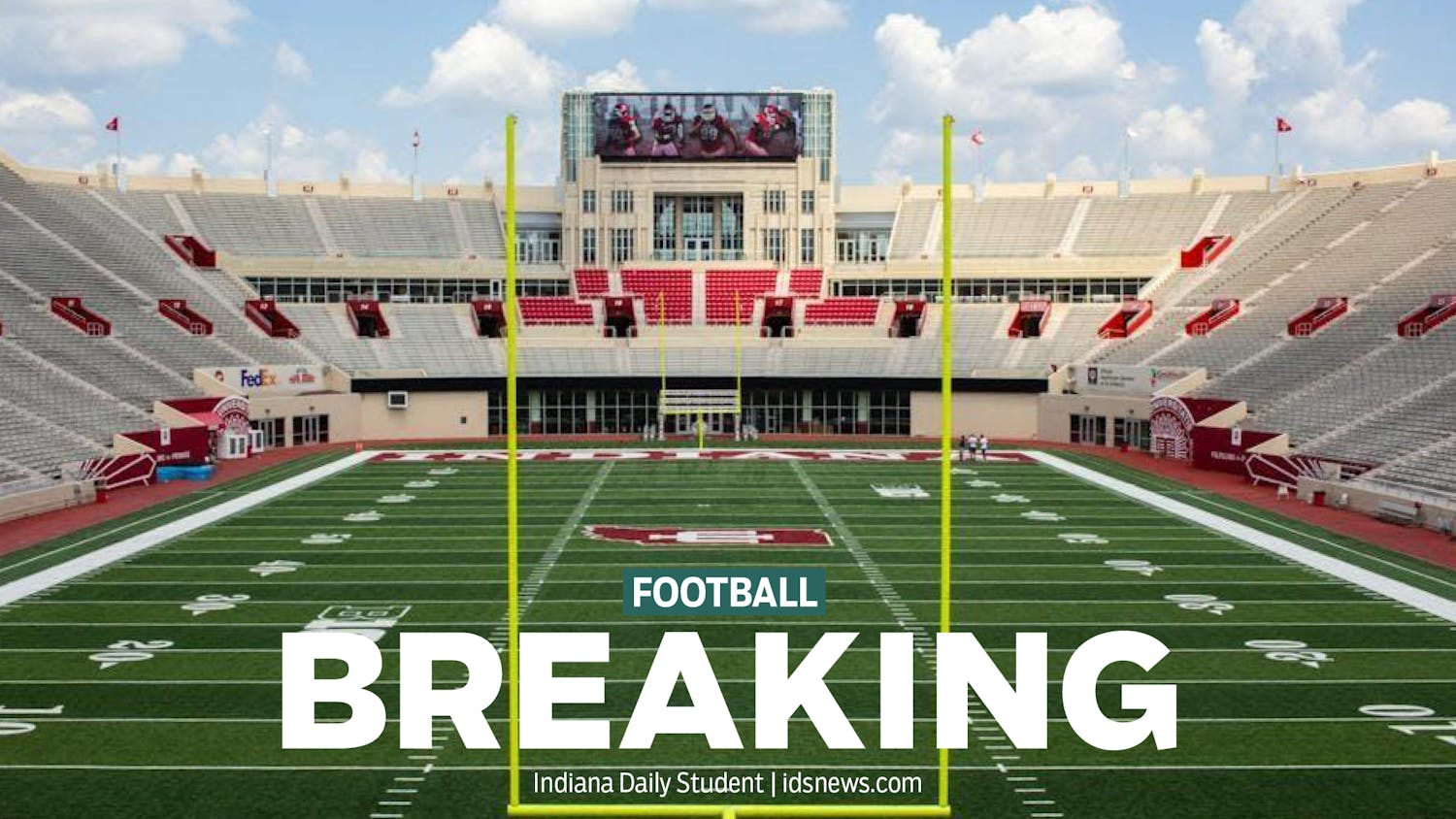Standing at just 5 foot, 4 inches at 14 years old, Roman Celentano was certainly too small to play goalkeeper. There was too much goal to cover and not enough body to cover it with.
The sophomore goalkeeper has since grown nearly a foot taller, standing at 6 foot 3 inches according to his IU Athletics bio. His legacy between the sticks at Armstrong Stadium is quickly growing larger.
Take a look at his nearly unbelievable numbers — his .923 save percentage is the second best in the country; a goals against average of .266, good for third in the nation. Seven shutouts through 11 games, just one back of the national leaders. In two seasons, only once has Celentano allowed more than one goal in a game.
Celentano has blossomed behind an evergreen IU defense. IU has only allowed three goals this season. No team with as many games played as IU has allowed fewer.
But it isn’t just All-Big Ten defenders Spencer Glass and Daniel Munie making Celentano look good. For one, Celentano won three Big Ten Defensive Player of the Week awards and the Big Ten Goalkeeper of the Year award this season.
He’s been a driving force all season for an IU team that earned the No. 3 seed in the NCAA Tournament.
But to those that have seen him grow from too small to a star, Celentano’s patient ascent to starting for IU has been a long time coming.
When Celentano arrived at IU the summer before his freshman year, he put a sign above the door in his bedroom.
“I will be starting goalkeeper at Indiana next year,” it read.
Coming into IU, Celentano was fourth on the depth chart, well behind then-starter redshirt senior Sean Caulfield.
The sign was a reminder to push for his goals, helping him visualize what he one day could do.
Not being the No. 1 guy wasn’t foreign to Celentano. With his club, Sockers FC Chicago, Celentano was No. 2 behind Alex Budnik, a member of the U-17 U.S. Men's National Team and now the junior goalkeeper for Dartmouth College.
Like with Sockers FC, IU offered Celentano a chance to work his way up the ladder.
Celentano had offers from several other schools, including an opportunity to play at Loyola University Chicago. He got a chance to visit IU and immediately fell in love with the program.
“He wanted to go there and earn his spot,” David Richardson, Celentano’s coach with Sockers FC, said. “He didn’t want to go to a place where he knew his spot was gonna be his for the next four years because that wasn’t going to make him any better.”
It played a big role in his decision. Celentano loved IU’s culture — it was about winning championships, but making sure the players became the best they could be, too.
IU was constantly producing pros and Celentano would have a chance to train against them all. IU’s program was a soccer focused environment, one where he could prove himself and become the best goalkeeper he could be.
He waited for the phone call with an offer. Eventually, he got it. After that, his decision was simple.
“I gotta go to Indiana,” he told his dad, Marcello Celentano.
Roman Celentano was only a two-star recruit, according to Top Drawer Soccer. IU head coach Todd Yeagley never expected Celentano to improve so quickly; He was a late developer recruited to be a project, not starting for a few years.
From the start, Celentano was told he’d be a redshirt freshman. Although he was frustrated, he accepted it — he couldn’t expect to come to IU as a freshman and immediately start.
Marcello Celentano told Roman to put his head down and go to work. He may be a redshirt as a freshman, but that was just where he was at in his development. The coaches will put him in when it’s right, he said.
But Roman Celentano didn’t redshirt. Yeagley couldn’t afford for him to.
Celentano was doing workouts with other redshirts when Yeagley pulled him aside and asked if he was ready to start. Celentano said yes.
On Oct. 1, 2019, after Caulfield struggled to start the 2019 season, Celentano started in goal against Northwestern.
He’s started 25 straight games since.
“He’s always been in someone’s shadow, so I’m just happy for him this year that he gets to at least share some of the spotlight,” Marcello Celentano said.
The first time Celentano went to Europe with Neil Thompson to train was in 2013.
Thompson, Celentano’s goalkeeper coach since he was 10, said the trip was just to acclimate Celentano to European training and take him to some tourist sites.
For Celentano, it was a business trip. He brought business cards that read “Roman Celentano, Goalkeeper,” and handed them out to the goalkeepers coach at Sunderland, which was in the English Premier League at the time.
The teams in Europe told him they didn’t look at goalkeepers under 6-foot.
Thompson said height is more of a stigma than a true measure of talent, but he does admit more height means more coverage.
“It just made him proactive,” Thompson said. “I think he worked on things that, whether he did it intentionally or just used it as a problem solving skill, that he, you know, had to be able to dive in a certain way.”
Celentano was able to use his lack of height to his advantage. It became a problem he could solve. Well before he grew taller than most of his peers, he was working harder than everyone else.
He became obsessed with the craft, constantly studying goalkeepers and picking the minds of coaches he met in England. He was analyzing goalkeepers even Thompson didn’t know about.
At Thompson’s Camp React, a goalkeepers camp Celentano attended annually, he was beating 16 and 17 year olds in games when he was only 14.
“When you’re developing everybody has different things you need to get better at, and one was him becoming the boss of the box,” Richardson said.
Celentano continued to keep his head down and work harder. He took two more trips to Europe to train. In 2016 he was training with older age groups. In 2019, his last trip to Europe, he was working with Sporting Lisbon’s U-19 team. He was also much taller than his first visit.
“He was very good at being patient with himself,” Thompson said. “He’s still that way now. He just takes everything one step at a time.”
Celentano is singularly focused. He quit football before taking up soccer in fourth grade and didn’t play any other sports. On the pitch, his years of training has set him up to stay locked in during matches.
He quickly worked his way into being a club player with Sockers FC by seventh grade. Celentano spent 10 months of the year training with the club and typically trained at Thompson’s Big Cat Goalkeeping academy during the week as well.
“He was a guy that always did what was above and beyond, even to sometimes where we’d have to say ‘Hey Roman, we don’t want you to practice today,’ or ‘You’re doing too much, that’s why your back is bothering you,’” Richardson said.
In four years, Celentano started all but one match for Sockers FC. By the time he got to IU, he had evolved into a well rounded goalkeeper. The results, eventually, were sure to follow.
“This season is a good season for Roman, and he’s done well,” Thompson said. “But this isn’t Roman playing well, this is Roman being Roman.”
Celentano likes facing pressure.
During penalty kicks against Penn State, with the Big Ten Tournament title on the line, just one save away from icing the sixth consecutive Big Ten trophy for IU, Celentano was ready.
It was just like he had been visualizing in his head for the three nights before. He wanted this moment. When Penn State’s senior midfielder Callum Pritchatt stepped up to take his shot, Celentano chose to dive to his left.
He tipped the shot onto the post and thought it went in before turning and seeing it spin away.
Celentano had to wait seven seconds from the time he made the save to when his teammates reached him to celebrate.
But he’s a patient man.




